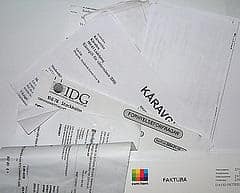Invoicing should be used as a tool to market your law firm to propel you further to success.
Billing is the one part of legal practice that everyone hates. It can be awkward for both parties in the matter and more so than often it can be confusing to communicate about this particular subject matter.
The relationship with the client can suffer when it comes to billing because money always complicates things. This type of discussion doesn’t have to be dreadful as long as it is done in an open and timely manner.
Instead of dreading the process, billing can be used as a chance to further market your law practice. Think of it as an extension of client communication and when done correctly and gracefully, gives you a better of obtaining your next referral from the client.
Mistakes Must Be Avoided.
An invoice is a direct link to your reputation. The simplest mistake in billing can cause for a client to lose confidence in you as a lawyer.
Lawyers already have a negative perception to many people and if an invoice has a mistake, the lawyer’s honesty and credibility will likely be questioned.

Be aware of the messages your itemizations send to clients.
A client typically wants a clear outline and understanding of what he or she is paying for and if they feel some charges are unnecessary or if an invoice reads strangely, they will likely question negatively.
Invoices must be simple and to the point so the client can understand clearly. If they see a charge as unnecessary, it can create tension which is never good.
How one refers to a task should be congruent with how it shows up in the invoice. Details are important so the client understands elements of the charge such as quantity or volume.

Avoid any other non-specific terms that the client may perceive as excessive. We’ve listed a few here:
- Conference. (With whom?)
- File Review. (Shouldn’t you be up-to-date?)
- Phone Call. (With whom?)
- Left Voicemail. (How long did the message really take to leave?)
- Attempt to contact. (Why was it an attempt? Whose ‘fault’ was that?)
Also beware of the following itemized expenses:
- Clerical work. (If the work is administrative in nature, it should not be charged at the same as attorney work.)
- Routine overhead. (Don’t try to sneak this in. These costs should be absorbed.)
You have value. Communicate that to the client.
You could quite possibly shoot yourself in the foot if you excessively charge client for services. This will indeed cause a loss of trust in you as an attorney.
If your bill does not match court records, it may hurt you indefinitely.
Finally, you should show progress with each itemization. If you’re doing a lot of work for a client that may seem redundant, show your progress in each line item. Instead of two entries labeled “Review of corporate finances,” list them as “Review of corporate finances: 2000-2001” and “Review of corporate finances: 2002-2003.” This issue can be avoided by concentrating your time. Clients would rather pay for larger blocks of time than a few minutes here and there.
How to market during the billing process.

Billing before informing can feel like the client is being blindsided and can affect chances for any future clientele.
Keeping the client informed with consistent communication beyond an invoice solidifies their trusts in you because the line of communication was kept consistent.
The best way to provide information to your clients and to market to them during the billing process is to provide a cover letter with your invoice. This cover letter should detail the value you are providing to the client. The information you provide is the only way your client will know how you’re spending your time and their resources.
Explain the research you’ve done and what it takes to do your job. Tell the client about the progress you’ve made on their matter. If you wrote off or discounted time, inform the client exactly why he or she does not have to pay for it. Include on the invoice an itemization of all of the time you worked, along with a redaction of the time you’re writing off so that the client can see what the total was before the write-off.
The two most important things to get right in the cover letter/invoice package are:
1. Thank the client for his/her business.
2. 
The bottom line about invoices.
You might not know when a client is dissatisfied. A client might feel that he or she is being overcharged for your services even when that’s not the case, and the client might not bring this up with you. Most clients don’t want to cause trouble and are afraid of what will happen if they dispute bills.
The consequences for you may not be so subtle. The client will simply stop referring you and will no longer use your services for their next matter.
The bottom line: don’t surprise your client.
It’s better to have a potentially difficult conversation over the phone discussing additional costs than sending higher than anticipated invoice without explanation. It’s better to contact the client about potential problems than to force the client to contact you. The client may pay the bill without complaint, but then choose to never use your services again. A loss of a client is also a loss of future referrals.


